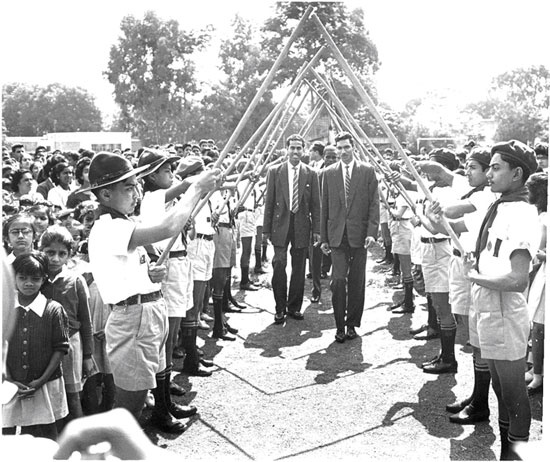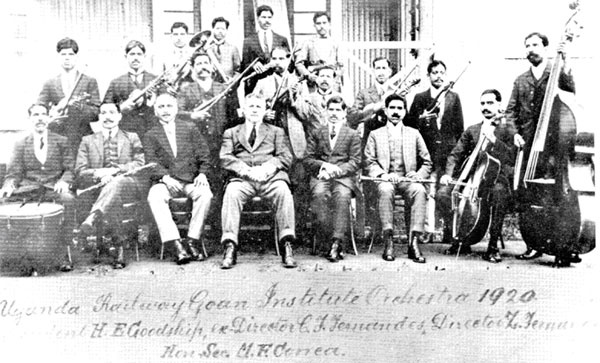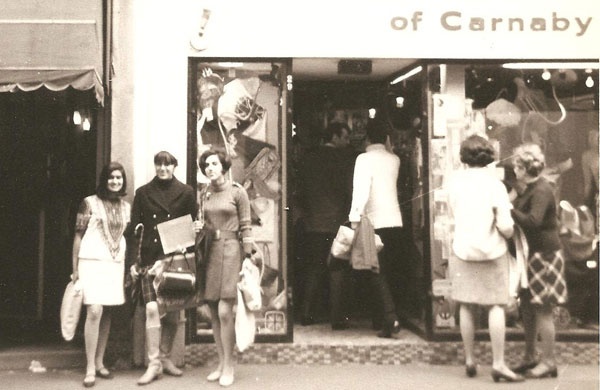The population of Goans in Uganda was meager but certainly it was adequate enough to form an Association. On April 24, 1905, the Entebbe Goan Institute came into being, with A. J. Reggo as Convener and President and James De Silva as Secretary. Perhaps as a token of appreciation for the retinue of Goans in the Civil Services, the British provided the land for the clubhouse at the 'peppercorn' rent of Rs 1 for 49 years. As in most Colonial outposts, life for Goans revolved around the Club. Armando Rodrigues, writer, born in Uganda recalls:
The Club was our second home. There was no closing time for the bar. Sundowners (dances) were held every month as was Housie. Weddings and anniversaries were celebrated at the Club, so was Christmas. Concerts and Konkani plays were organised frequently by the Jolly Boys. Marshall Fernandes was a good violinist, Ishmael Francis played the drums, Beatriz Almedia (later my mother-in-law) played the piano. After work got over at 4 pm, we dashed home for tea and then to the Club. Ladies played badminton, cards, men played tennis, field hockey, cards, carom and volleyball. After that, we quenched our thirst at the bar, with the usual camaraderie of 'my round or your round.. Favourite drinks were Bell beer, Nile beer or Scotch and soda. Other diversions were fishing, hunting, walks, picnics in the famous Botanical Gardens. We were a close-knit community.
The War Years
In Africa, the war would mark a radical departure in the mindset of the Goans and bring to the fore questions about their own identity and nationality. They were Portuguese nationals but miles away from any Lusitanian influence and totally dependent on the British Empire for their employment. Was nationality determined by anything other than geography, government and circumstance? How was loyalty defined in an equation where they had interchanged one colonial government for another? Certainly choices had to be made in the interests of self-preservation. In a secret meeting held in Mombasa, at the onset of the war, a group of Goans decided that it would be in their interests to opt for British citizenship. Portugal it was felt, was not altogether unsympathetic to Spain's position in the war and in the event of an Axis victory, it would seriously jeopardise their position, many of whom were civil servants in the British government. In June of 1939, the Government House in Nairobi received a spate of forty-four applications, within a span of six weeks, for British citizenship;. It would set a precedent in the Diaspora. Until then, Goans had faithfully returned to Goa upon retirement but now the umbilical cord was being loosened. Africa was tinged with the hue of permanence. It was becoming apparent, the East African Goan's future was tied in with Britain rather than Portugal.
The Goan Young Man of Kenya
Letter dated August 1950, from Goans Overseas Association (GOA), Nairobi to Minister of State for Colonial affairs requesting separate representation for Goans on the Municipal council board.
A 1921 census put the number of Goans in Kenya at 2, 000. Another indicator of Goan presence and prominence is given by the Revenue Collection data of 1931. They paid 7% of the total Non-native poll-tax. Interestingly, they paid 18.4% of the total revenue from consumption of Wines and Spirits. They had an enormous fondness for brandy and outstripped consumption of both the European and Indian communities. At any rate, by 1948, their numbers had risen to 7,159, a swell which prompted Dr Antonines C. L de Souza, to ask searching questions about their role in Kenya.
Dr Souza, was by some accounts, an arresting personality with a shock of salt and pepper hair, and a stern voice which he modulated for emphasis and effect. Through to 1945, he took an active part in the East African Indian National Congress, rising to the ranks of Vice-president. When, in keeping with the traditions of the Congress, he stood for President, he was humiliatingly defeated by A. B. Patel. This defeat, which he took to be ethnically motivated by him being a Catholic Goan, left him embittered towards Indian politics. Whereupon he severed his ties with the Indian Congress and began concentrating on the Goans as an individual community. In 1952, an editorial of Goan Voice, Kenya, of which A . C. L de Sousa was founder and editor, posed the question, "Where does the Goan young man stand in this conflict between the old and the new, the spiritual and the material, the permanent and the evanescent? What is his place to be in the complex society of East Africa, his contribution to its progress and his justification for an honorable place in it?"
A Wedding in Malawi
Most of the Goan men at the wedding had been taken abruptly, without any warning. They arrived at Mulanje unprepared for what awaited them and in a state of shock. The conditions in the prison were abysmal. They were given one blanket to share and made to sleep on the concrete floor. They were allowed to shower once a day but were not given a towel. The food was an African diet which Goans could not bring themselves to eat. There were two tiny cells which housed all the inmates. The lack of ventilation made some suffer from bronchitis and asthma. On the third day, they were stripped of whatever money or belongings they had on them and served with a 28 day detention order. Within a few days the men were covered in lice, suffering from malaria and malnutrition and two had to be hospitalised. After two weeks in detention, they were released but declared Prohibited Immigrants; they had forty-eight hours to leave the country. It seemed almost impossible that all this was happening because of a Goan wedding in Limbe, Malawi.
|
They had lived most, if not all their lives, in East Africa. Generally, these were middle-class Goans or at least Goans with middle-class aspirations, the product of a good education system. Goa had few opportunities to offer this cadre of teachers, clerks from the Civil Services and banking sector. They did not find it hard to get absorbed in the workforce in the United Kingdom. Dr Cornel DaCosta, who arrived in the UK in 1962, as a young student, observers:
The main concerns were accommodation in the UK. Work was plentiful and in general, the availability of accommodation got better as people understood where best to establish themselves. Often, this was as close to those already here. A sizeable number of Goans settled in Tooting and Tooting Bec, the Manor House area and Newham. The overall numbers were not terribly significant, and Goans were indistinguishable from other Indians or Pakistanis. Goa was not yet on the tourist map, ignorance amongst the Whites was of a higher order and they had a marked lack of curiosity about the new settlers or their former background. On the whole, in the best British tradition we were left alone, thankfully.
|




